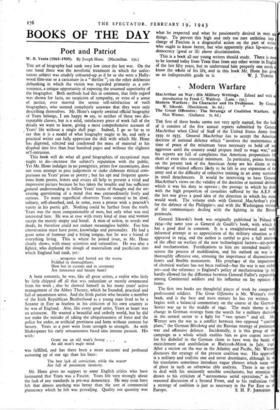BOOKS OF THE DAY
Poet and Patriot
W. B. Yeats (1865-1939). By Joseph Hone. (Macmillan. 255.)
THE art of biography had sunk very low since the last war. On the one hand there was the novelistic treatment in which the unfor- tunate subject was crudely coloured-up as if he or she were a Holly- wood film-star or a caricature in a " thriller "; on the other deliberate debunking in which the victim was regarded primarily as a con- venience, a unique opportunity of exposing the assumed superiority of the biographer. Both methods had this in common, that little regard was shown for facts, no suspicion of sympathy, or even of a sense of justice, ever marred the serene self-satisfaction of such biographers, who seemed completely unaware that they were only describing themselves. Mr. Hone's eagerly awaited official biography of Yeats belongs, I am happy its say, to neither of these two dis- reputable classes, but is a solid, satisfactory piece of work full of the details we want to know, giving a most comprehensive account of Yeats' life without a single dull page. Indeed, I go so far as to say that it is a model of what biography ought to be, and only a practical writer can fully appreciate the skill with which Mr. Hone has digested, selected and condensed the mass of material at his dispdsal into less than four hundred pages and without the slightest se'f-intrusion.
This book will do what all good biographies of exceptional men ought to do—increase the subject's reputation with the public. Yet Mr. Hone indulges in no panegyrics, prints few encomiums, does not even attempt to pass judgement or make elaborate critical com- parisons on Yeats' prose or poetry ; but his apt and frequent quota- tions from poems, letters and essays all help to present a vivid and impressive picture because he has taken the trouble and has sufficient apatural understanding to follow Yeats' trains of thought and the un- ceasing questioning of a mind that was extraordinarily lively and curious. To many superficial observers Yeats seemed to be aloof, solitary, self-absorbed, and, to some, even a poseur with a peacock's vanity in his poetic gift. Nothing could be further from the truth. Yeats was the most companionable of men, but only what was real interested him. He was at ease with every kind of man and woman except the merely empty and banal. A man of action, in words and deeds, he therefore could not endure meaningless babble. For, him conversation must have point, knowledge and personality. He had a great sense of humour and a biting tongue, but he was a friend of everything living. This is where he joined issue, as Mr. Hone clearly shows, with many scientists and rationalists. He was also a fighter, who deplored the slough of materialism and pacificism into which England had sunk, yet :
. . . arrogance and hatred are the wares Peddled in thoroughfares.
How but in custom and in ceremony Are innocence and beauty born?
A born romantic, he was, like all great artists, a realist who little by little chipped off all that was redundant or merely ornamental from his work ;.also he showed himself in his many years' active management of the Abbey Theatre, which he founded, practical and full of uncommon sense. And the Irish patriot who became a member of the Irish Republican Brotherhood as a young man lived to be a Senator in Eire as fearless in his criticism of his own country as he was of England. Also, like every good artist, Yeats at heart was an aristocrat. He wanted a beautiful and orderly world, but he did not make the mistake of taking the ubiquitousness of force and the police for order, or artificial prettiness and form without content for beauty. Yeats as a poet went from strength to strength. As with Shakespeare his early sensuousness fused into intense passion. His wish : Grant me an old man's frenzy . .
An old man's eagle mind was fulfilled, and has there been a more accurate and profound summing up of our age than his lines: The best lack all conviction, while the worst• Are full of passionate intensity.
Mr. Hone gives no support to some English critics who have insinuated that Yeats was a Fascist. Yeats felt very strongly about the lack of any standards in pre-war democracy. He may even have felt that almost anything was better than the sort of commercial plutocracy which he felt was prevailing. Quality not quantity was
what he respected and what he passionately desired in men things. To pervert this high and only too rare ambition into charge of Fascism is a disgraceful action on the part of write who ought to know better, but who apparently place lip-service democracy (good or ill) above discrimination.
This is a book all our young writers should study. There is ma to be learned today from Yeats than from any other writer in Englis of the last fifty years, but to understand him properly one needs t know the whole of his life, and in this book Mr. Hone has giv


























 Previous page
Previous page